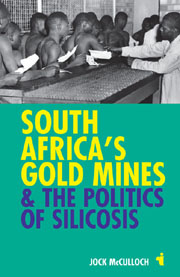Book contents
- Frontmatter
- Contents
- List of Photographs
- Preface: South Africa in the Twentieth Century
- Acknowledgments
- List of Abbreviations
- A Brief Chronology
- 1 Gold Mining & Life-Threatening Disease
- 2 Creating a Medical System
- 3 Compensation
- 4 A White Science
- 5 Myth Making & the 1930 Silicosis Conference
- 6 Tuberculosis & Tropical Labour
- 7 Conflict over the Compensation System
- 8 Healing Miners
- 9 The Sick Shall Work
- 10 Men Without Qualities
- Select Bibliography
- Index
7 - Conflict over the Compensation System
Published online by Cambridge University Press: 05 February 2013
- Frontmatter
- Contents
- List of Photographs
- Preface: South Africa in the Twentieth Century
- Acknowledgments
- List of Abbreviations
- A Brief Chronology
- 1 Gold Mining & Life-Threatening Disease
- 2 Creating a Medical System
- 3 Compensation
- 4 A White Science
- 5 Myth Making & the 1930 Silicosis Conference
- 6 Tuberculosis & Tropical Labour
- 7 Conflict over the Compensation System
- 8 Healing Miners
- 9 The Sick Shall Work
- 10 Men Without Qualities
- Select Bibliography
- Index
Summary
The opening of the new gold fields in the Free State was the largest single investment in the industry's history. Between 1946 and 1950 Anglo American poured more than £65,000,000 into the development of thirteen new mines. It was a massive undertaking designed to ensure the corporation's future and it coincided both with the advent of apartheid, which extended and deepened existing inequalities, and with a period of intense conflict between the white trade unions and industry. That conflict began with the passage of the Silicosis Act No. 47 of 1946 and ended twelve years later with the Pneumoconiosis Act No. 57 of 1956.
The Mine Workers Union (MWU) believed that the Silicosis Medical Bureau had a policy of deliberately minimising the number of awards. In 1951 it complained in the Rand Daily Mail: ‘Not one per cent of mine employees would pass a vote of confidence in the Bureau which has today become a white elephant in every sense of the word.’ The underlying problem was the intractability of dust and the refusal of the Bureau to compensate white miners with what the MWU considered palpable disease. Under apartheid, black miners lay largely outside of that struggle.
On the surface the system of medical review and compensation appeared to be working smoothly. The industry-generated data for the period 1945 to 1955 show that the tuberculosis rate among long-term black miners, those with poor physiques and new recruits X-rayed at the Witwatersrand Native Labour Association (WNLA) depot was 0.1 per cent.
- Type
- Chapter
- Information
- South Africa's Gold Mines and the Politics of Silicosis , pp. 106 - 120Publisher: Boydell & BrewerPrint publication year: 2012



